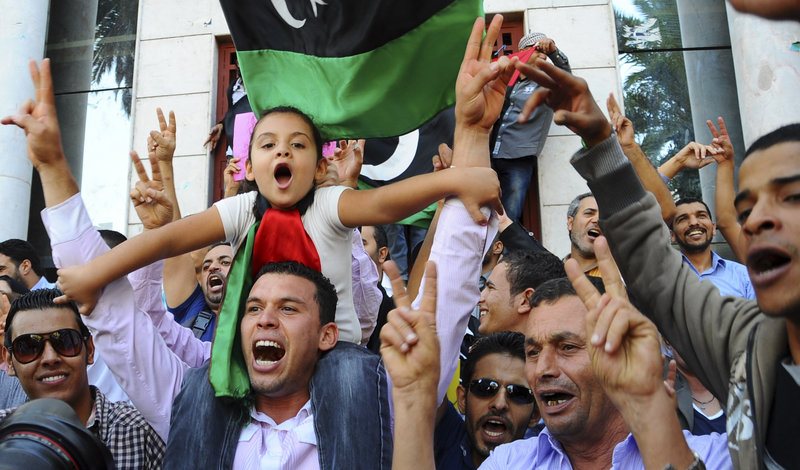Like the U.S. military manhunt for Saddam Hussein, the search for the fugitive dictator Moammar Gadhafi took seven months. He finally popped up, like his Iraqi counterpart, from an inglorious hiding place and is now dead.
The similarities end there.
How President Obama helped bring about the end of a long-standing American antagonist in Libya captures in microcosm the vast difference in the way he and his predecessor, George W. Bush, have employed diplomacy and military power against their enemies.
Both approaches resulted in the removal of longtime U.S. nemeses who had enjoyed a few years in Washington’s favor. But Bush’s invasion cost nearly $1 trillion and more than 4,400 American lives, while Obama’s more limited intervention highlighted a national security strategy that emphasizes global burden-sharing, and secretive tactics and technologies whose legality has been questioned. The NATO airstrikes on Gadhafi’s convoy Thursday included a missile launched from a U.S. drone aircraft.
“Without putting a single U.S. service member on the ground, we achieved our objectives,” Obama said Thursday in a brief Rose Garden appearance.
Obama’s technocratic approach to governing has served him far better in foreign policy, where facts, expert appraisal and intelligence often trump ideology, than it has in domestic politics. At a time of severe economic uncertainty at home, the achievements abroad, including the killing of Osama bin Laden in May, have not translated into political popularity.
Moreover, his foreign policy approach has earned him critics on the right, who say his one-of-the-gang approach has diminished America’s stature in the world; and on the left, who view his embrace of drone strikes as a violation of his pledge to restore the rule of law to national security.
A senior administration official, speaking on the condition of anonymity to discuss internal thinking, described Obama’s strategy as one that “uses U.S. military power in a more focused way with smaller footprints, leveraging our very unique capabilities.”
“When we took office, you had an approach of very large U.S. military footprints in Iraq and Afghanistan,” the official said. “We’ve moved toward a far more targeted approach that leverages U.S. military capabilities rather than large forces overseas.”
A Nobel Peace Prize laureate, Obama has demonstrated a calculated ruthlessness in waging war against al-Qaida, killing bin Laden, U.S.-born Muslim cleric Anwar al-Awlaki and numerous other foot soldiers through special operations and drone strikes.
He has expanded that often-unseen war, improvising at times to explain the legal rationale behind the operations or, at other times, declining to acknowledge the U.S. role at all.
After months of Republican criticism that his leadership has been limp and late in Libya and in the other uprisings of the Arab Spring, Obama asserted Thursday that Gadhafi’s demise “comes at a time when we see the strength of American leadership across the world.”
“We’ve taken out al-Qaida leaders, and we’ve put them on the path to defeat,” he said. “We’re winding down the war in Iraq and have begun a transition in Afghanistan. And now, working in Libya with friends and allies, we’ve demonstrated what collective action can achieve in the 21st century.”
Republicans have called his methodical approach a sign of foreign policy indecision and inexperience.
Obama waited more than a week after Libya’s crackdown against the anti-government movement began in February to comment on the insurrection and then refused to utter Gadhafi’s name or call for his removal. He eventually did so in a phone call with German Chancellor Angela Merkel, a day after French President Nicolas Sarkozy called for Gadhafi’s ouster.
Obama’s decision to allow European allies to take the lead in lobbying for military intervention was based, in large part, on his reading of the poor U.S. image in the Arab Middle East.
Working with NATO and Arab allies, along with a swelling armed Libyan force on the ground, Obama ruled out ground troops early. Ultimately, Obama took out Gadhafi by proxy, as Libyan forces routed the dictator’s protectors and took full control of the country.
“You have won your revolution,” Obama told the Libyan people Thursday.
But Republicans continue to criticize the approach despite the results.
It was telling on Thursday that some congressional Republicans, including Sen. Marco Rubio of Florida, considered a possible vice presidential choice, credited the French and British leadership for Gadhafi’s death, but not Obama.
“It’s important to ask, whether it’s that senator or another one, or others who are observing this, what action, what alternative action they’re suggesting,” White House press secretary Jay Carney told reporters Thursday.
“Were they suggesting U.S. troops on the ground? Were they suggesting unilateral action by the United States of America, using force? Obviously those were options that were assessed here at the White House. The president chose a different path,” Carney said.
Carney and other White House advisers declined to discuss the political implications of Gadhafi’s death Thursday, although some grumbled privately about Republican praise for European governments but not the U.S.
“The president has been able to build a record that speaks for itself,” the senior administration official said.
Send questions/comments to the editors.



Success. Please wait for the page to reload. If the page does not reload within 5 seconds, please refresh the page.
Enter your email and password to access comments.
Hi, to comment on stories you must . This profile is in addition to your subscription and website login.
Already have a commenting profile? .
Invalid username/password.
Please check your email to confirm and complete your registration.
Only subscribers are eligible to post comments. Please subscribe or login first for digital access. Here’s why.
Use the form below to reset your password. When you've submitted your account email, we will send an email with a reset code.